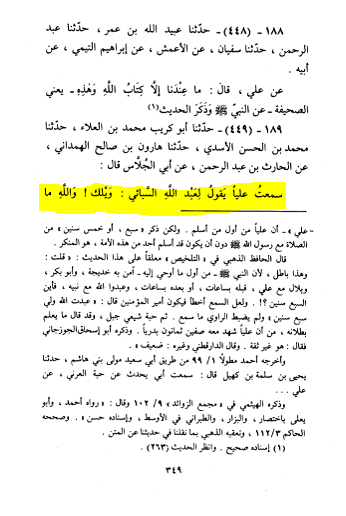باسمك اللهم
اللهم صلى على سيدنا محمد
The Mother of Believers, sayyidatuna A’ishah سلام الله عليها reportedly said:
قُولُوا خَاتَمُ النَّبِيِّينَ وَلَا تَقُولُوا لَا نَبِيَّ بَعْدَهُ
Say ‘Seal of the Prophets’ but do not say ‘there is no prophet after him’
(Musannaf Ibn Abi Shaybah; v.14, p.521, published by Dar Kunuz Ishbiliya)
In his checking, Sa’d bin Nasir bin Abdul-Aziz Abu Habib ash-Shathri declared this narration sahih.
But it is argued that if the narration is authentic, the intention of sayyidatuna A’ishah is merely to affirm the second coming of Jesus. Those who make this argument point to the subsequent narration of another companion, al-Mughirah bin Shu’bah رضى الله عنه:
قَالَ رَجُلٌ عِنْدَ الْمُغِيرَةِ بْنِ شُعْبَةَ صَلَّى اللَّهُ عَلَى مُحَمَّدٍ خَاتَمِ الْأَنْبِيَاءِ لَا نَبِيَّ بَعْدَهُ قَالَ الْمُغِيرَةُ حَسْبُكَ إِذَا قُلْتَ خَاتَمُ الْأَنْبِيَاءِ فَإِنَّا كُنَّا نُحَدَّثُ أَنَّ عِيسَى خَارِجٌ فَإِنْ هُوَ خَرَجَ فَقَدْ كَانَ قَبْلَهُ وَبَعْدَهُ
A man said in the presence of al-Mughirah bin Shu’bah: “Blessing of Allah upon Muhammad, Seal of the Prophets, there is no prophet after him”. Mughirah said: “It is sufficient for you to say ‘Seal of the Prophets’ for we were informed that Jesus shall come, so he is both before him and after him.” (ibid):
Firstly, the narration attributed to al-Mughirah رضى الله عنه is considered weak due to the weakness of the narrator Mujalid.
Secondly, the fanatics of the so-called Khatm un-Nubuwwah movement claim that the second coming of Jesus, a Prophet of God, does not violate the finality of Muhammad’s Prophesy because Jesus was made a Prophet prior to Muhammad عليهما السلام
Yet according to this narration, al-Mughirah bin Shu’bah rejected such a feeble attempt at reconciling the two apparently contradictory doctrines of the second coming of the Messiah and the finality of Prophesy, when he said that Jesus is a prophet both prior to and subsequent to the Prophet Muhammad صلى الله عليه وسلم
From the perspective of the fanatics of the Khatm un-Nubuwwah movement, there is nothing wrong with the man’s statement “blessing of Allah upon Muhammad, Seal of the Prophets, there is no prophet after him”, indeed, this is their very slogan. Then how do they explain Mughirah’s رضى الله عنه correcting of the man and explaining to him that it is sufficient to simply say that Muhammad is Seal of the Prophets without adding ‘there is no prophet after him’?



















